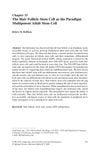
Elastin-like recombinamers show promise for better wound healing and skin regeneration.
 6 citations,
January 2020 in “Postepy Dermatologii I Alergologii”
6 citations,
January 2020 in “Postepy Dermatologii I Alergologii” Check and treat low iron and vitamin D levels in people with hair loss.
 12 citations,
March 2019 in “Journal of Cosmetic Dermatology”
12 citations,
March 2019 in “Journal of Cosmetic Dermatology” PRP injections improve hair thickness and density in hair loss, but more research needed.
 69 citations,
April 2019 in “Biomedicines”
69 citations,
April 2019 in “Biomedicines” PRP and HF-MSCs treatment improves hair growth, thickness, and density in androgenetic alopecia.
 February 2022 in “Research Square (Research Square)”
February 2022 in “Research Square (Research Square)” High levels of Anti-Müllerian Hormone (AMH) in the blood can strongly predict Polycystic Ovarian Syndrome (PCOS) and related issues in women of reproductive age.
 4 citations,
September 2021 in “Biomolecules”
4 citations,
September 2021 in “Biomolecules” Using Platelet-Rich Plasma and Adipose-Derived Mesenchymal Stem Cells together can improve healing, including wound healing, bone regeneration, and hair growth.
 24 citations,
May 2012 in “International Journal of Dermatology”
24 citations,
May 2012 in “International Journal of Dermatology” The document concludes that eyelash trichomegaly, which is the abnormal growth of eyelashes, can be present from birth, caused by diseases, or result from certain medications.
 11 citations,
June 2018 in “Sexual medicine reviews”
11 citations,
June 2018 in “Sexual medicine reviews” Stromal Vascular Fraction might help with male sexual dysfunction, but more research is needed to confirm its safety and effectiveness.
 April 2016 in “Journal of The American Academy of Dermatology”
April 2016 in “Journal of The American Academy of Dermatology” Dutasteride is more effective than finasteride for hair growth with similar side effects.
4 citations,
April 2020 in “Dermatology practical & conceptual” Topical finasteride works faster and better than 17α-estradiol for postmenopausal hair loss.
 50 citations,
June 1999 in “Annals of Oncology”
50 citations,
June 1999 in “Annals of Oncology” Giving docetaxel weekly at 40 mg/m² is manageable and has low toxicity for cancer patients.
 3 citations,
December 2019 in “Journal of Cosmetic and Laser Therapy”
3 citations,
December 2019 in “Journal of Cosmetic and Laser Therapy” PRGF treatments increased hair number and thickness in people with hair loss, with more injections leading to better results.
 5 citations,
November 2011 in “Expert Review of Dermatology”
5 citations,
November 2011 in “Expert Review of Dermatology” The document concludes that early diagnosis and a comprehensive treatment plan are crucial for managing hair loss in children, with a focus on both medical and psychological support.
 2 citations,
February 2024 in “Journal of the European Academy of Dermatology and Venereology”
2 citations,
February 2024 in “Journal of the European Academy of Dermatology and Venereology” The study created a 27-item measure to assess the impact of skin diseases.
 November 2020 in “Journal of The American Academy of Dermatology”
November 2020 in “Journal of The American Academy of Dermatology” Certain immune markers may predict chemotherapy response in mesothelioma, and nivolumab is a tolerable and effective treatment for advanced non-small cell lung cancer.
 291 citations,
October 2005 in “Proceedings of the National Academy of Sciences of the United States of America”
291 citations,
October 2005 in “Proceedings of the National Academy of Sciences of the United States of America” Adult stem cells from rat whisker follicles can regenerate hair follicles and sebaceous glands.
 24 citations,
December 2013 in “Sexual medicine reviews”
24 citations,
December 2013 in “Sexual medicine reviews” Finasteride can cause sexual problems and depression in young men.
 1 citations,
January 2008 in “Springer eBooks”
1 citations,
January 2008 in “Springer eBooks” Hair follicle stem cells can turn into many cell types and may help repair nerve damage and have other medical uses.
 39 citations,
January 2012 in “Reproductive Biology and Endocrinology”
39 citations,
January 2012 in “Reproductive Biology and Endocrinology” About 8.5% of women in Salvador, Brazil, have Polycystic Ovary Syndrome.
 223 citations,
September 2018 in “Rheumatology”
223 citations,
September 2018 in “Rheumatology” JAK inhibitors are effective in treating various immune-related diseases, not just rheumatoid arthritis.
 May 2024 in “Journal of cosmetic dermatology”
May 2024 in “Journal of cosmetic dermatology” Heat-treated Limosilactobacillus fermentum with menthol, salicylic acid, and panthenol promotes hair growth and balances scalp microbiome in people with androgenetic alopecia.
 39 citations,
January 2016 in “Journal of Cutaneous and Aesthetic Surgery”
39 citations,
January 2016 in “Journal of Cutaneous and Aesthetic Surgery” Injecting platelet-rich plasma during hair transplant surgery improves hair regrowth rate, speeds up skin recovery, and enhances hair quality.
 39 citations,
March 2018 in “Archives of Dermatological Research”
39 citations,
March 2018 in “Archives of Dermatological Research” Androgens may block hair growth signals, targeting this could treat hair loss.
 148 citations,
December 2018 in “Journal of autoimmunity”
148 citations,
December 2018 in “Journal of autoimmunity” Alopecia areata is an autoimmune disease causing patchy hair loss, often with other autoimmune disorders, but its exact causes are unknown.
 December 2014 in “Faculty Opinions – Post-Publication Peer Review of the Biomedical Literature”
December 2014 in “Faculty Opinions – Post-Publication Peer Review of the Biomedical Literature” Low-level light therapy significantly increased hair density and thickness in people with hair loss, but they didn't notice a difference.
 October 2024 in “Journal of the Endocrine Society”
October 2024 in “Journal of the Endocrine Society” Ayme-Gripp Syndrome was confirmed in a woman through genetic testing, highlighting the need to consider rare genetic conditions in diagnoses.
 26 citations,
February 2009 in “Drug Development Research”
26 citations,
February 2009 in “Drug Development Research” 17α-estradiol is a safe estrogen that might protect the brain and doesn't cause feminization, needing more research for treating brain diseases.

New treatments for hair loss show promise, including plasma, stem cells, and hair-stimulating complexes, but more research is needed to fully understand them.
 28 citations,
January 2016 in “Vitamins and hormones”
28 citations,
January 2016 in “Vitamins and hormones” Thymosin β4 helps improve skin healing and reduce scarring.
October 2022 in “International Journal of Molecular Sciences” Fish collagen peptides can significantly promote hair growth.




























